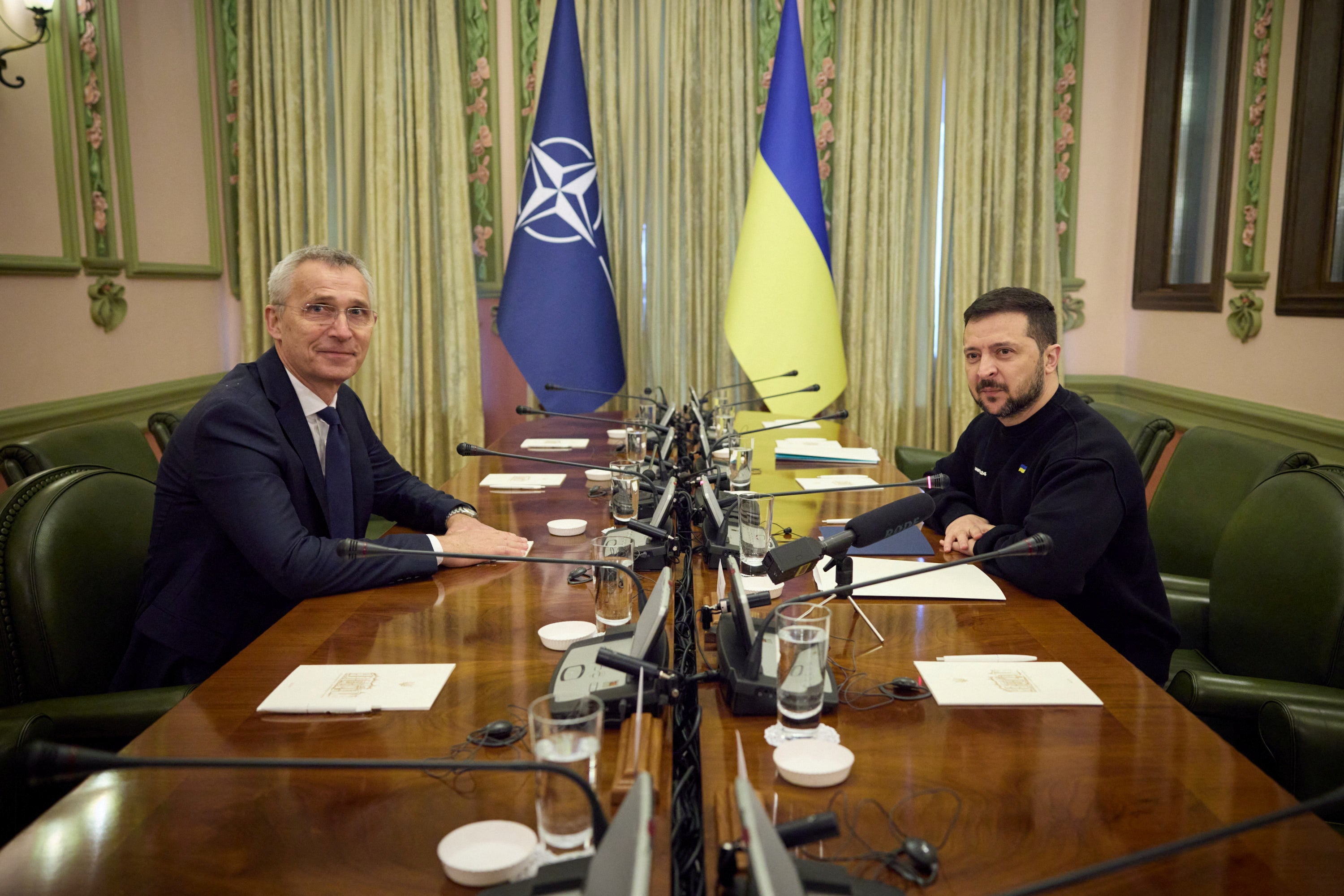Zelensky says now is the time for Ukraine to join Nato as alliance chief visits Kyiv
‘Nato stands with you today, tomorrow and for as long as it takes,’ Jens Stoltenberg says on first visit to Kyiv since Russia’s invasion started

Your support helps us to tell the story
From reproductive rights to climate change to Big Tech, The Independent is on the ground when the story is developing. Whether it's investigating the financials of Elon Musk's pro-Trump PAC or producing our latest documentary, 'The A Word', which shines a light on the American women fighting for reproductive rights, we know how important it is to parse out the facts from the messaging.
At such a critical moment in US history, we need reporters on the ground. Your donation allows us to keep sending journalists to speak to both sides of the story.
The Independent is trusted by Americans across the entire political spectrum. And unlike many other quality news outlets, we choose not to lock Americans out of our reporting and analysis with paywalls. We believe quality journalism should be available to everyone, paid for by those who can afford it.
Your support makes all the difference.Ukraine’s president Volodymyr Zelensky has told Nato chief Jens Stoltenberg that it is time to let his country into the alliance – during Mr Stoltenberg’s first visit to Kyiv since Russia‘s invasion began.
Mr Stoltenberg said that the “rightful place is in the Euro-Atlantic family ... is in Nato”, inviting Mr Zelensky to a Nato summit in Vilnius, Lithuania, in July. The Ukrainian president said that he believed the summit could be “historic” but that his nation needs a roadmap to membership.
“There is no objective barrier to the political decision to invite Ukraine into the alliance and now, when most people in Nato countries and the majority of Ukrainians support Nato accession, is the time for the corresponding decisions.” Mr Zelensky said.
The statements will rile the Kremlin and Russian president Vladimir Putin, who has made various claims about the reasons behind Moscow’s invasion of Ukraine but has insisted in recent months that preventing Kyiv from joining Nato was a key goal. Kremlin spokesperson Dmitry Peskov told reporters on Thursday that bringing Ukraine into the military alliance “will present a serious, significant danger to the security of our country”. Moscow said similar things when Finland officially joined Nato last month, a move that doubled the size of the land border the alliance shares with Russia. Neighbouring Sweden is expected to join soon too, possibly by the time of the Nato summit in July.
Ukraine announced a bid for fast-track membership of Nato last September after the Kremlin unilaterally announced it had annexed four Ukrainian regions that its troops have partially occupied. Nato has no official presence in Ukraine and provides only provides non-lethal support to Kyiv, but has provided a significant amount of support during the 14-month war. Mr Stoltenberg pledged continued military support for Ukraine, saying that, so far, Nato allies had trained tens of thousands of Ukrainian troops and provided €65bn (£57bn) of military aid alone and tens of billions of pounds in other areas. “Nato stands with you today, tomorrow and for as long as it takes,” Mr Stoltenberg said.
The Nato secretary-general’s visit to Kyiv comes at an important juncture in the war, with Kyiv hoping to launch a counteroffensive against Russia’s forces in the coming weeks or months. Mr Zelensky has pushed for more weapons from the West to enable Kyiv’s troops to hold off any Russian advances on the ground in the southern and eastern regions of Ukraine, and then push on. Mr Zelensky pushed Mr Stoltenberg to help ensure those weapons arrived, saying that delays in receiving more weapons caused deaths in Ukraine.
Stoltenberg’s trip came a day before Nato defence officials discuss new military supplies for Ukraine at their latest meeting at the Ramstein Air Base in Germany on Friday. Denmark and the Netherlands announced on Thursday they would jointly donate 14 Leopard 2 tanks to Kyiv. In a joint statement, the Danish and Dutch defence ministers said the estimated cost of €165m (£145m) “to jointly acquire, refurbish and donate” will be equally divided between the two Nato members. “In this way, we will jointly take part in the Leopard 2 coalition, supported by many partners and allies,” they said.
Acting Danish defence minister Troels Lund Poulsen stressed that the tanks were not Danish but are “bought in collaboration with the Netherlands”.
On Wednesday, the US announced $325m (£261m) in new military aid, including ammunition for High Mobility Artillery Rocket Systems (Himars), advanced missiles and anti-tank mines.
Reuters and Associated Press contributed to this report
Join our commenting forum
Join thought-provoking conversations, follow other Independent readers and see their replies
Comments